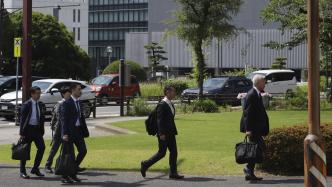
Officials from Japan's Ministry of Land, Infrastructure, Transport and Tourism came to Toyota's headquarters in Aichi Prefecture for a surprise inspection on Tuesday following safety testing scandals at several Japanese automakers.
Japanese automakers apologize after another scandal
The exposure of this scandal stems from the previous violation of regulations by Daihatsu Industries. Therefore, the Ministry of Land, Infrastructure, Transport and Tourism of Japan conducted a further investigation into whether 85 automakers had violated regulations during the application process for mass production certification.
The results showed that 38 models of five automakers, including Toyota, Mazda, Yamaha Motor, Honda and Suzuki, had violations - incorrect or manipulated safety test data were submitted when applying for vehicle certification.

On June 4, 2024, local time, in Aichi Prefecture, Japan, officials from the Ministry of Land, Infrastructure, Transport and Tourism entered the Toyota Motor Corporation headquarters building to conduct on-site inspections of violations in vehicle performance testing at Toyota Motor Corporation in Aichi Prefecture.
Japan's Ministry of Land, Infrastructure, Transport and Tourism said it has found that seven Toyota models (some of which have been discontinued) have certification violations, including three mass-produced models that submitted false data in pedestrian protection tests, and the remaining four discontinued models had incorrect collision tests and other testing methods.
In addition to Toyota, Mazda was found to have rewritten the engine control software of its MX-5 RF and Mazda 2 models to affect output tests, and to have falsified crash test results for five models, including the Atenza/Mazda 6 and Axela. Yamaha and Honda were found to have made false statements in their respective noise test reports. Suzuki was found to have made false statements about the brake test results of a past model.
After the notice was released, Toyota, Honda and Mazda held a press conference on the violations, and the executives of the three companies all bowed and apologized at the press conference.
Currently, six models of Toyota, Mazda and Yamaha Motor have stopped shipping, including three models of Toyota: Corolla Fielder, Corolla Axio and Yaris Cross.
According to the Nihon Keizai Shimbun, the Ministry of Land, Infrastructure, Transport and Tourism will conduct on-site inspections while separately confirming whether the six models in production meet safety and environmental performance standards. If there are no problems, the suspension of shipments will be gradually lifted.
It’s not that simple. Is it Toyota’s fault or the regulations’?
It is reported that the three models that have stopped shipments account for less than 2% of the 11 million vehicles produced by Toyota last year.
The greater impact falls on parts suppliers. According to the Nikkei, more than 1,000 parts suppliers may be affected. Toyota will negotiate loss compensation with customers individually.
However, according to CNN, Toyota believes that it has not violated safety regulations and customers do not need to stop using their cars. In a statement released on Monday, Toyota said that in six of the seven models with certification violations that had been identified, "testing methods differed from government-defined standards."
In an interview with The Japan Times, Satoru Aoyama, senior director at Fitch Ratings, said Toyoda seemed to be suggesting in his speech on Monday that the lengthy certification process is one of the bottlenecks facing Japanese automakers. If Japanese manufacturers have to go through the government-imposed certification process, they may lose market competitiveness.
The certification procedure mentioned above is the automobile product type certification system stipulated in the Japanese Road Transport Vehicle Law, which was implemented in Japan in 1951. According to the Nihon Keizai Shimbun, it requires Japanese automobile manufacturers to submit applications to the Ministry of Land, Infrastructure, Transport and Tourism in advance when producing and selling new cars, and undergo review to see whether they meet safety standards such as braking performance and environmental performance. If they pass the review and undergo type certification, they only need to confirm whether they meet the standards within the manufacturer, and there is no need to submit data for each vehicle and accept national inspection.
The system played an important role in improving the quality of domestically produced cars when Japan's auto industry was rising. But as the times change, some people believe that it is gradually becoming a hindrance. "Although the system has been revised several times since its enactment in 1951, the regulations have not kept pace with the times," Takaki Nakanishi, an analyst at Astris Advisory Japan, wrote in a report.
According to Bloomberg, Akio Toyoda said: "(This incident) will provide an opportunity for the government and automakers to understand what is best for customers, the competitiveness of Japan's auto industry and how to develop the certification system itself." Relevant analysts also hold similar opinions, "This may provide an opportunity to reform the certification testing system that does not conform to the actual situation."
Toyoda also hopes that "the government and the companies involved in the scandal can work together to ensure that vehicles are properly tested."
What is right and what is wrong? Scandal has become a big issue
Koji Endo of SBI Securities said Japan's certification tests are very strict, much stricter than in other countries, but he also said the scandal has become a big problem for Toyota, the world's largest automaker, and has had a negative impact on the brand's reputation.
In December 2023, Toyota subsidiary Daihatsu was raided by the government after it was revealed that the company had falsified crash safety test records since the 1980s. Daihatsu admitted to 174 violations, including falsifying crash tests, involving 64 models. Ultimately, more than 1 million vehicles were recalled.
Earlier this year, Toyota Industries Corporation was subject to an in-depth two-week investigation by the Ministry of Land, Infrastructure, Transport and Tourism. The Ministry of Land, Infrastructure, Transport and Tourism determined that the company had falsified test data in order to meet qualified values, and ultimately decided to cancel the product certification of two forklift engines and one construction vehicle engine.
It was the discovery of certification violations at Daihatsu Industries and Toyota Industries that led to the expansion of the problem to major Japanese manufacturers. It is reported that Toyota's factory operations will not stop during the investigation, but the production of the three models under investigation will be suspended. According to a previous statement by the Ministry of Land, Infrastructure, Transport and Tourism of Japan, the other four problematic automakers will also be further investigated one by one.


